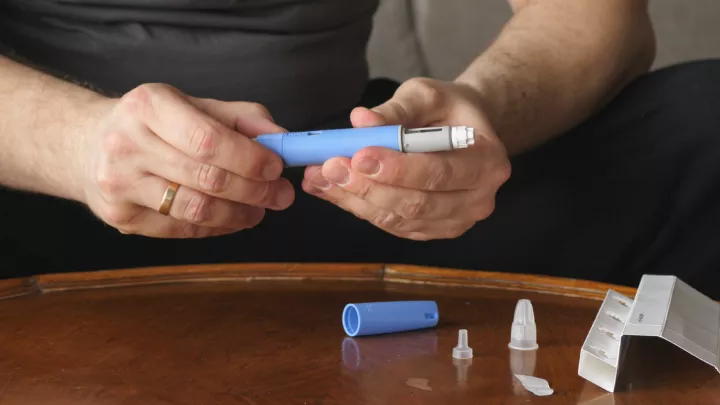Thyroid cancer on the rise among young women


The prevalence of thyroid cancer is on the rise and is increasingly more common in young women. The fifth most common cancer in women, and 12th overall among both men and women, it is also one of the most treatable, with a five-year survival rate of 98.1 percent.
“While thyroid nodules occur in up to 50 percent of people by age 60, only about 5 to 10 percent end up being cancer, and most are papillary cancer, which is usually slow-growing and very curable,” says Whitney Goldner, MD, Nebraska Medicine endocrinologist.
Most people with thyroid cancer do not have symptoms, however, sometimes a painless nodule in the neck, or a swollen or enlarged lymph node may be one of your first signs. Other possible symptoms include a hoarse voice, pressure in the neck, or difficulty swallowing. Any of these symptoms warrant a visit to your doctor to be evaluated, says Dr. Goldner.
Because many nodules cannot be felt, diagnostic tests will generally include an ultrasound of the neck and thyroid and a blood test to evaluate the function of your thyroid. The majority of thyroid cancers are typically found incidentally either during a neck exam or imaging of the neck for unrelated reasons due to the lack of symptoms, notes Dr. Goldner.
To schedule an appointment with one of our thyroid specialists, please call 800.922.0000.
If cancer is suspected, a type of biopsy, called a fine needle aspiration, will be performed to determine whether further evaluation or surgery is needed. However, in some cases, the biopsy alone can be inconclusive. “We can also do additional molecular testing on the biopsy specimen, which gives us more information than the biopsy alone,” says Dr. Goldner. “This helps determine whether the nodule is likely to be a cancer, and if surgery is needed.”

Standard thyroid cancer surgery involves making a small incision just above the breast bone and removing one or both lobes of the thyroid and possibly the surrounding lymph nodes, depending on location of the tumor. “Most patients go home the same day or the following day without significant wound care or diet restrictions," says Zafar Sayed, MD, Nebraska Medicine head and neck surgical oncologist. “Surgery is very successful and has an excellent cure rate for the vast majority of our patients.”
The actual surgery to remove part or all of the thyroid gland is complex, due to the fact that the thyroid is located on the trachea, also called the windpipe, and near the esophagus. Surgery should be done by an experienced and well-trained surgeon to avoid damage to these sensitive areas, or to the nerve that controls your vocal cords.
More aggressive thyroid cancers, or those that have spread to the lymph nodes, may also be treated with targeted radioactive iodine following surgery. Radioactivity is paired with iodine, which is absorbed by thyroid cells. The radiation then destroys any additional thyroid tissue or cancer cells remaining. You will also require life-long thyroid hormone medication to replace the function of the thyroid if both lobes of the thyroid need to be removed.
Some patients may be candidates for a minimally invasive surgical technique called robotic–assisted thyroid surgery.
The robotic procedure, which leaves no scarring on the neck, involves making a small incision, about an inch long, under the arm. Tiny, robotic tools are used to make a path under the skin to the thyroid. The surgeon then uses a small camera to view the area and removes all or part of the thyroid.

“The procedure is equally as safe and effective as conventional thyroid surgery,” says Abbey Fingeret, MD, Nebraska Medicine surgical oncologist, the only fellowship-trained endocrine surgeon in the state and part of a team of experts in thyroid treatment. The procedure typically adds an hour to the standard surgery procedure when one lobe of the thyroid is removed and two hours or more if both lobes are removed. To qualify for robotic surgery, you must be a non-smoker and have a healthy body weight. If you have additional health issues, they must be well controlled.
“This procedure is a big improvement in terms of quality of life for these patients,” says Dr. Fingeret. “Standard surgery can leave a large scar in the middle of the neck, which the patient can see every time he or she looks in the mirror. This can cause a lot of stress and anxiety as it serves as a constant reminder of their cancer and mortality.”
Thyroid cancer is three times more common in women than men. Other known risk factors include a family history of thyroid cancer and radiation exposure to the neck area.
“Prompt attention to signs and symptoms is the best way to diagnose thyroid cancer early,” notes Dr. Goldner. “Thyroid cancer has been on the rise for the last couple of decades and approximately 35 percent of all cases occur in younger adults under 45 years old. We think this increase may be due to environmental factors, as well as the fact that we are finding small thyroid cancers incidentally through increased use of imaging."
“The good news is that there is a lot of exciting research in the field and we continue to develop a very personalized approach to the diagnosis and treatment of persons with thyroid nodules and thyroid cancer, always with the goal of improving quality of life.”
If your tests come back suspicious or positive for thyroid cancer, we have a multidisciplinary team of experts at Nebraska Medicine who can collaborate on your case to provide a comprehensive team approach to your care. These experts include surgeons, endocrinologists, radiation therapists, radiologists and medical oncologists. If necessary, you can be seen by multiple members of your team who will be involved in your care in one streamlined visit.





